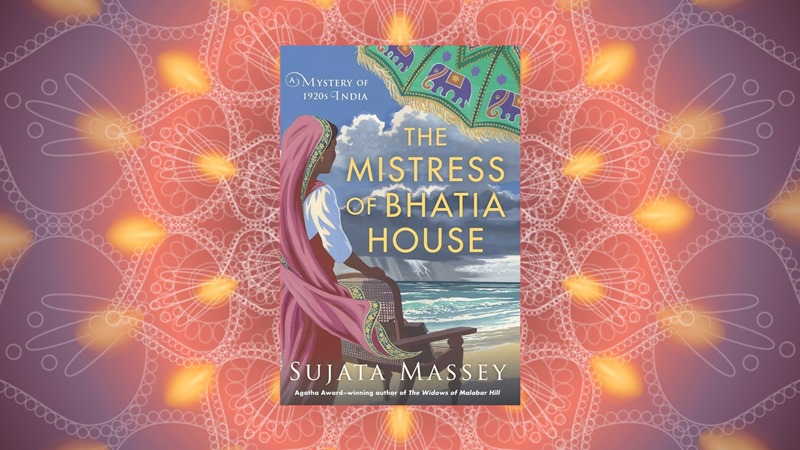The Mistress of Bhatia House by Sujata Massey
What’s it About?
Bombay’s only female solicitor, Perveen Mistry, grapples with class divisions, sexism, and complex family dynamics as she seeks justice for a mistreated young woman in this thrilling fourth installment in Sujata Massey’s award-winning series.
It’s a happy day when a reader can dive into a suspenseful new novel written by international best-selling and multiple award-winning author Sujata Massey. Her eagerly anticipated work The Mistress of Bhatia House (Soho Crime), latest in the Perveen Mistry series, is now available.
Review by Linda Hitchcock | BookTrib
These historical fiction mysteries are well-plotted, thoroughly researched, densely layered, nuanced and satisfying. Without lecturing or moralizing the need for civil rights reforms, legal and social injustice issues relevant to the time are incorporated into the storyline, gently educating the reader.
I first became an admirer in 1997 with The Salaryman’s Wife, winner of the Agatha Award for Best First Novel. It was the first of eleven enthralling mysteries set in contemporary Japan with protagonist Rei Shimura, an American of Japanese descent.
Rei was introduced as an ESL-English teacher before she became an antique dealer and subsequently an art and vintage clothing expert. Rei is an adventurous and strong character who frequently changed jobs and stumbled across dead bodies until 2014 when the series paused (temporarily one hopes) with The Kizuna Coast.
The Perveen Mistry Series
Miss Perveen Mistry from Bombay, India, then a law student at Oxford University, was introduced in The Oxford Incident, set in 1918 as part of Sujata Massey’s collection of two novellas and three short stories titled India Gray, published in 2015. Three years later, a richly imagined new series featuring Perveen was launched with the full-length novel The Widows of Malabar Hill.
Miss Mistry returned to India armed with her hard-earned degree to become Bombay’s first woman solicitor and quickly became embroiled in solving a strange and mysterious murder case. The novel made a huge splash winning the Agatha Award, the Macavity Award, and the Lefty Award for Best Historical Mystery as well as the Mary Higgins Clark Award.
Two additional novels featuring the intrepid Miss Mistry followed: The Satapur Moonstone in 2019 and The Bombay Prince in 2021. The fourth installment is The Mistress of Bhatia House with what might be the most challenging investigation of her career.
Historic Bombay’s Only Female Solicitor
Perveen Mistry has experienced her own share of difficulties. Despite her stellar academic achievements and keen intelligence, as a woman, she was neither permitted to sit for the bar examination in England nor in India. She is a working solicitor but the only job available to her is as an associate in her father Jamshedji Mistry’s successful law firm as others would not consider hiring a female attorney. She cannot be a barrister; that is, she cannot present or argue cases in court.
Discrimination and inequality before the law also deeply affect her personally. Perveen remains in a loveless marriage, legally tethered to Cyrus Sodawalla, an abusive, loathsome scoundrel. She quickly left him and returned to her family home where she has resided for nearly four years. Perveen didn’t qualify for divorce under the stringent, male preferential Parsi Marriage and Divorce Act as she could not prove her husband had committed adultery and cruelty. Ironically, to obtain a divorce, he would have to charge her with adultery and ruin her family’s good name.
Husbands, no matter how despicable, control the destiny of their spouse and any children. It’s disheartening that to protect her spotless reputation and because their relationship would be taboo, Perveen cannot keep company with Colin Sandringham, the Englishman she secretly loves. Not surprisingly, her preferred legal cases champion women’s rights.
Born into moderate wealth and privilege, Perveen Mistry is a member of a well-respected Parsi/Zoroastrian family, an ethnic minority noted for its education, culture and entrepreneurship as well as charitable and philanthropic efforts.
Zoroastrianism is a monotheistic religion, one of the oldest faiths, followed by Parsis, persons of Persian/Iranian origin, founded more than 3,000 years ago based on the teachings of the prophet Zoroaster, sometimes called Zarathustra. It emphasizes an eternal battle between the forces of good and evil. Many left Persia to settle in India and other countries after Arab Muslims conquered the region in the 7th century. There are generally fewer dietary restrictions than for Hindus as moderation is a key concept and meat is allowed. (One of the most renowned Parsi of the 20th century was Queen’s Freddy Mercury who was born in Zanzibar.)
The family’s spacious home is also occupied by Perveen Mistry’s brother Rustom, her sister-in-law Gulnaz and their infant daughter Khushy as well as the servants. The colicky new addition and her mother whose moods are swinging wildly have unsettled the peaceable balance in the household.
Battling Issues of Inequality
In The Mistress of Bhatia House, our heroine continues to grapple with human rights issues of sexism, racism and class-driven inequities in the adjudication of legal cases. India in 1922 has many child brides and distressingly high infant and child mortality. Birth control is not only unavailable but even information may be deemed illegal and access to physicians is denied to the majority.
The novel begins with an extravagant afternoon tea and fundraiser for a proposed women’s hospital specializing in maternal health issues held at the home of an influential Gujarati businessman. Perveen witnesses a horrifying accident as his only grandson’s clothing catches fire from one of many decorative candles lining the garden pathways.
Sunanda, his ayah (nursemaid), rushes to put out the flames by smothering them with her own body thereby sustaining severe burns herself. Curiously, her mistress blames the young woman for inadequately protecting the lively seven-year-old and neglects to provide her with adequate burn care. Soon after, Sunanda is arrested and jailed on an unrelated and specious charge. Perveen rescues her from prison and brings her to the Mistry household.
The hospital’s chief donor dies suddenly, apparently murdered by lead poisoning which casts suspicion upon the ayah and Dr. Miriam Penkar, a Jewish-Indian obstetrician and personal friend of Perveen’s, whose patients would benefit from the proposed hospital.
Riveting Mystery with Historical Basis
The Mistress of Bhatia House is a riveting murder case, filled with intriguing characters, a potentially life-threatening investigation that is complex and dangerous as there may be some high-level cover-ups involved. It is a spell-binding novel you will not want to put down until the final page is read.
Sujata Massey has revealed her series set in India was partially inspired by a trail-blazing woman, Cornelia Sorabji (1866-1954) who studied law at Oxford University and in the late 1890’s became India’s first female attorney. However, it took until 1923 for Mithan Tata Lam to become the first woman to be admitted to the Bombay Bar.
Booklovers who enjoy reading Rumer Godden, Naomi Hirahara, Tasha Alexander, Vaseem Khan, Harini Nagendra and H. R. F. Keating, the creator of Inspector Ghote novels, are certain to embrace Perveen Mistry. In the right hands, this character and these hypnotic stories would translate well to screen adaptations.
About Sujata Massey:
Sujata Massey is the author of fourteen novels, two novellas and numerous short stories that have been published in eighteen countries. Her novels have won the Agatha, Lefty, Macavity and Mary Higgins Clark prizes and been finalists for the Edgar, Anthony, and Harper Lee literary awards. Sujata writes mystery and suspense fiction set in pre-Independence India, as well as a modern mystery series set in Japan.
Born in England to parents from India and Germany, Sujata was raised primarily in St. Paul, Minnesota, although her home for almost thirty years has been Baltimore, Maryland. She earned a B.A. in Writing Seminars at Johns Hopkins University and wrote features for the Baltimore Evening Sun newspaper before becoming a novelist.


